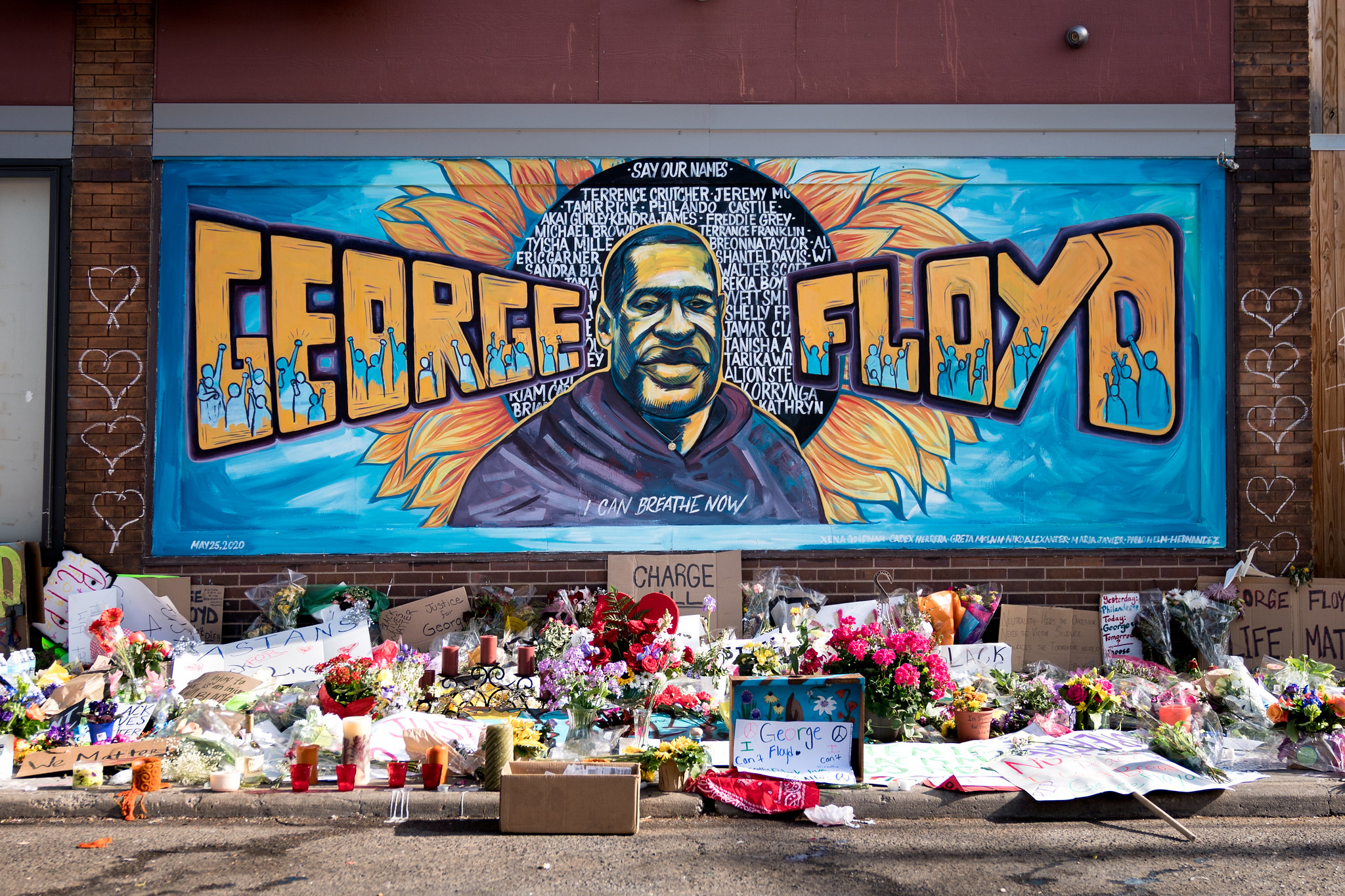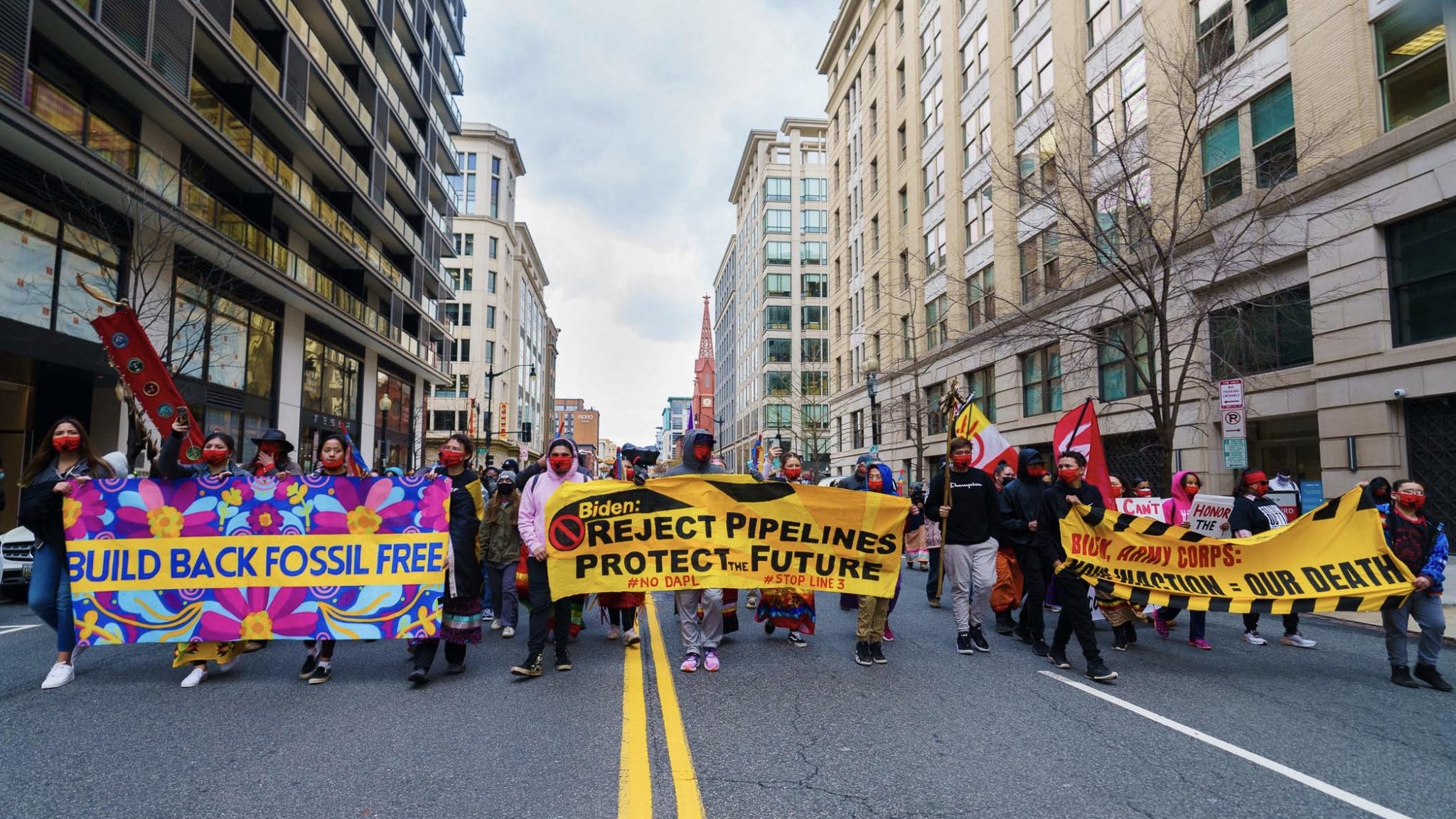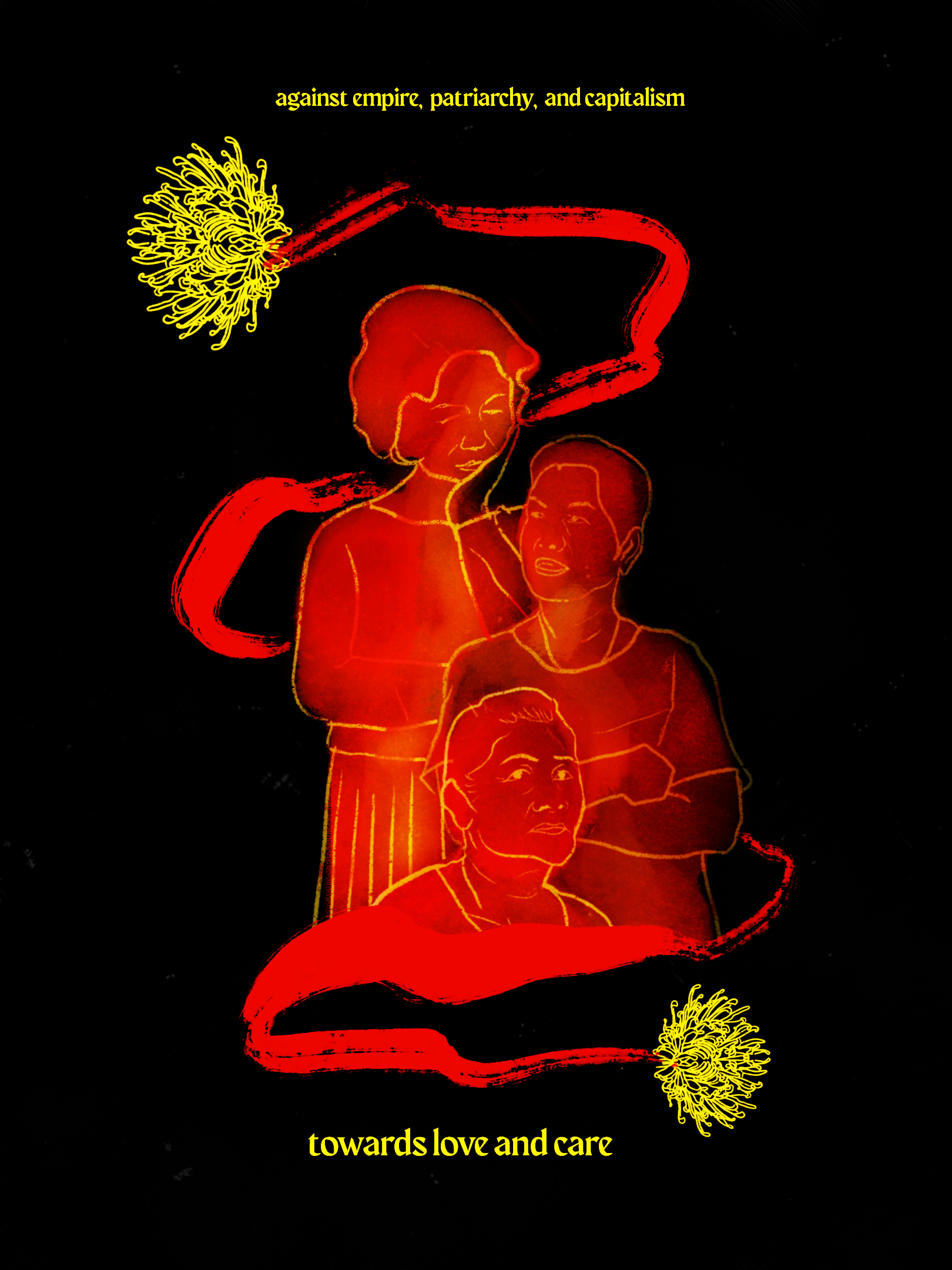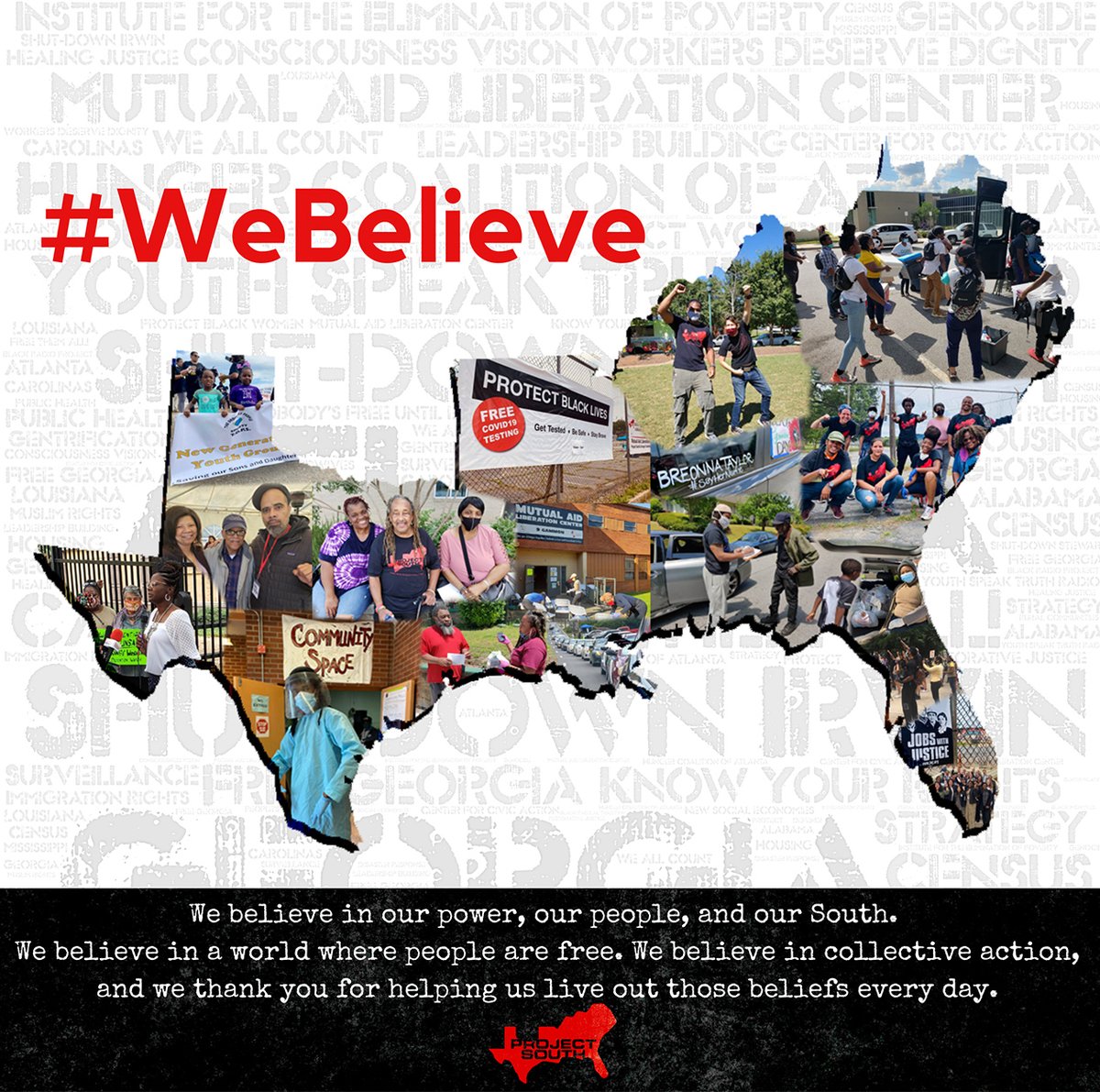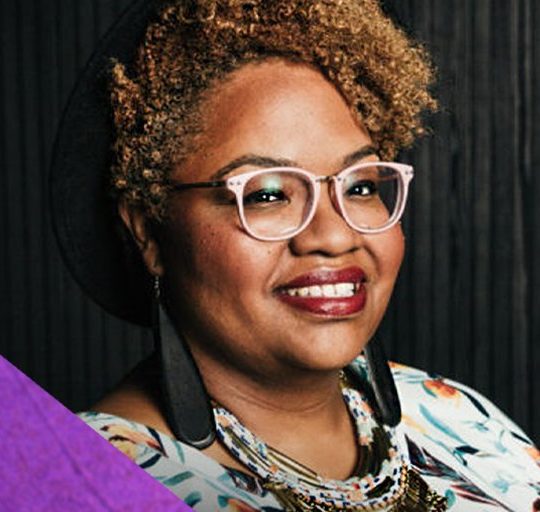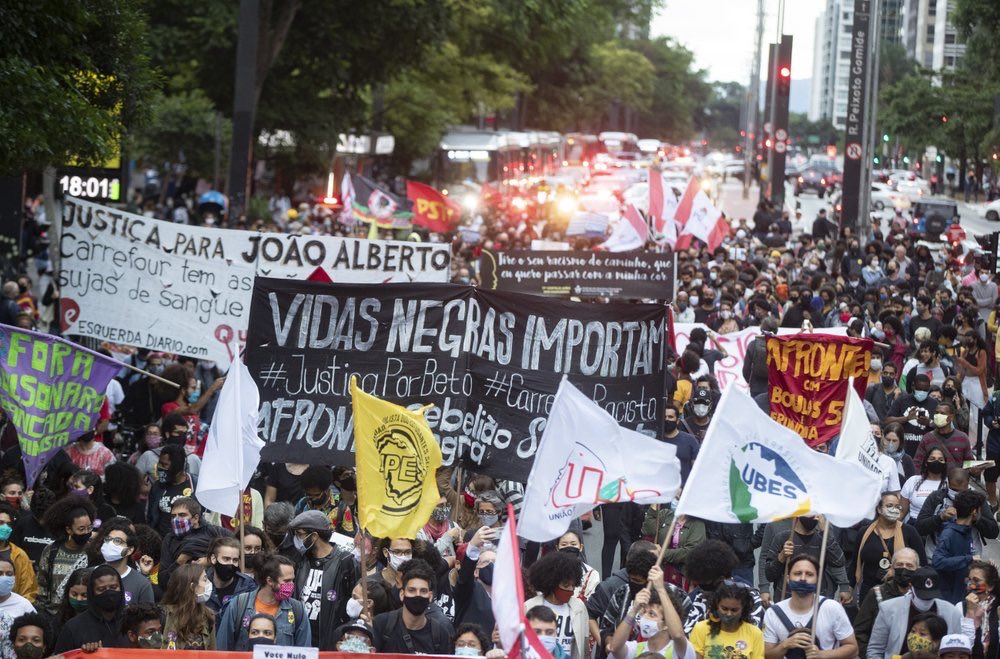Category: Blog
Philanthropy Open Letter for Humanity & Justice
Toward True Accountability, Healing and Transformation
Toward True Accountability, Healing and Transformation
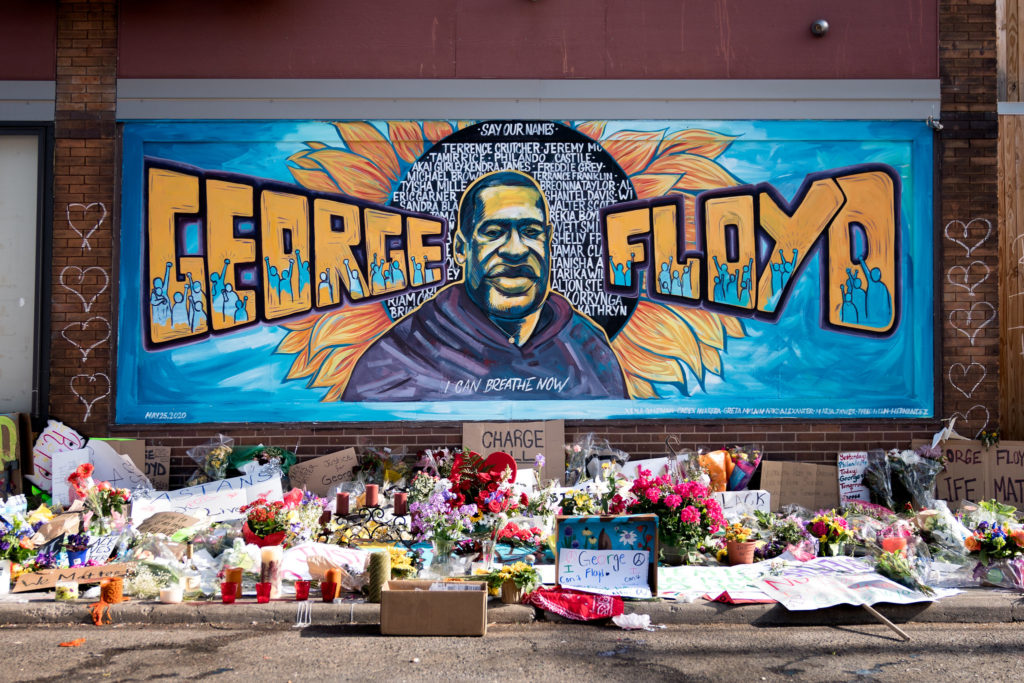
In the midst of an unprecedented pandemic this past year, courageous grassroots leaders who have organized for racial, economic and social justice for decades sparked an unprecedented global uprising for liberation and justice. Thanks to persistent grassroots organizing and movement building efforts, more people than ever began taking action against the global rise of white supremacy, authoritarianism, and the continued and destructive impact of systemic racism. From a new administration at the federal level to police-free schools and criminal justice reform victories at the local and regional levels, organizing has led to real change.
These movements continue to fight back against police brutality and state violence. They are leading massive marches in the streets, while also advocating in the corridors of power to transform racial capitalism. Even as regressive anti-protest bills make their way through many state legislatures in an attempt to criminalize dissent, our movements are undeterred. They are working to change the narrative in culture and in the media to engage more people in the ongoing push for justice. They are demanding an end to police violence and making concrete demands to end systems of mass incarceration and replace them with transformative solutions that communities need and want.
Even as movements show us how to win, heal and create anew, we know that the work of dismantling white supremacist ideologies that insidiously affect all aspects of our lives is far from over.
Last week’s guilty verdict at the Chauvin trial is just one example of the complicated journey we are collectively on in the work to address the root causes of injustice. We must challenge more than just the symptoms and move toward true accountability, healing and transformation. Even as we momentarily celebrated the guilty Chauvin verdict, 16-year-old Ma’Khia Bryant was being brutally murdered. Not only does this tragedy amplify the racial and gender injustice inherent in policing, the responses that followed her death highlight how racism and patriarchy work in tandem to deny the very humanity of those targeted by state violence.
Today, philanthropy must continue to prioritize funding and investing in grassroots organizing and movement building led by Black, Indigenous and communities of color. Solidaire member Eileen Farbman, who has made a sustained 10-year commitment to the Movement for Black Lives, recently challenged funders to move beyond the “boom and bust model” that releases funding only in response to Black death and suffering. She called instead for generous long-term commitments that give movement leaders space to breathe, recover, and strategize over the long term.
Solidaire echoes that call. Through our Movement Infrastructure Fund and Black Liberation Pooled Fund, we intend to broaden our base of grassroots and movement partnerships and continue to meaningfully resource and flank this beautiful power-building work.
There are so many movement partners to lift up; this ecosystem is indeed vibrant, connected and fierce. Here are just a few that inspire us. Learn more about them, listen to them and follow their lead:
-
- Action St. Louis
- Anti Police Terror Project
- Black LGBTQIA+ Migrant Project (BLMP)
- Black Visions Collective
- Communities Over Cages: Close the Jail ATL Campaign
- Dream Defenders
- Feminist Women’s Health Center
- Florida Restoration Rights Coalition
- Freedom to Thrive
- GINIW Collective
- Law for Black Lives
- Movement for Black Lives (M4BL)
- Solutions not Punishment Coalition (SNAPCo)
- Transgender, Gender Variant, Intersex Justice Project (TGIJP)
Solidaire members also have organized themselves through a Decarceration Working Group, which consistently puts issues of and education on mass incarceration on our collective radars through community building, political education and moving funding to trusted movement organizations.
As a community of donors committed to resourcing social movements for the long-haul, we know this is a critical time for continued, responsive and courageous action to match the courage of our movements. Our collective liberation depends on it. Join us— If you are a Solidaire member, learn more about the decarceration working group. If you are a funder or donor, learn more about our membership and movement partners.
Supporting Frontline Organizations Preserving Our Communities and the Planet
Supporting Frontline Organizations Preserving Our Communities and the Planet
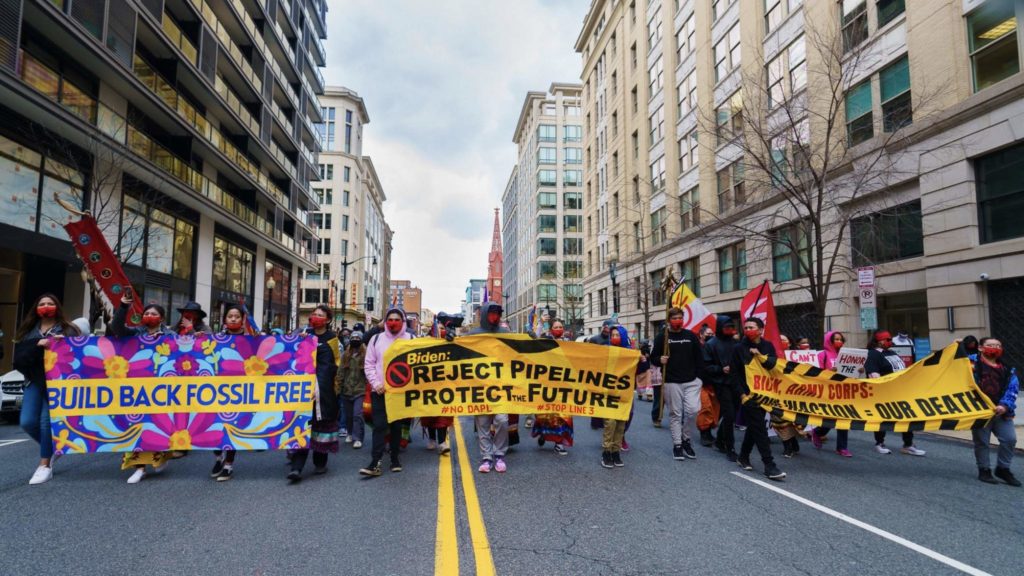
Today is Earth Day, a day we mark to celebrate the efforts to preserve and protect our planet. The first Earth Day was held in 1970 to raise awareness about the importance of clean air and water, which led to the creation of the United States Environmental Protection Agency and the passage of key environmental laws such as the Clean Water Act.
Yet we are in 2021, and communities all over the world—particularly working-class communities and communities of color—are still fighting to have access to their land, clean water and protection from environmental disasters. Fighting for racial justice means fighting for climate justice, because systemic racism makes Black people, Indigenous peoples and people of color far more susceptible to the impacts of climate change, resource exploitation, food insecurity, poor infrastructure, pollution and other health hazards.
As organizers speak out and fight back against exploitative corporations, they are doing so at the risk of their own lives. According to Global Witness, environmental defenders are facing increasing assaults and murders around the world, with three people being killed every week for defending their land and our environment. We honor activists like Berta Cáceres in Honduras, Le My Hanh in Vietnam and so many others who have been killed or attacked for defending their land, water and communities’ resources. We affirm our commitment to investing in the protection of climate justice organizers, so they can continue this critical work.
Solidaire members have been dedicated to funding visionary movement organizations that are working to advance climate justice from the ground up. Our member-led Climate Justice Working Group at Solidaire Network has moved resources to new and established climate justice movement formations working to defend land and water. Our members also take time to learn and organize others in their families and communities to fund people-powered climate solutions.
Here are some of our recent Climate Justice grantee partners working on the frontlines at a local, regional and national level:
-
-
Climate Justice Alliance envisions a world in which fairness, equity and ecological rootedness are core values. Climate Justice Alliance members have won significant victories against polluting and extractive industries. They are building local alternatives that center traditional ecological and cultural knowledge and create a pathway for a regenerative future.
-
-
-
GINIW is an Indigenous-women, 2-spirit led frontline resistance to protect our Mother, defend the sacred and live in balance. They are currently protesting against the Line 3 pipeline on Anishinaabe lands in so-called Minnesota.
-
-
Gulf Coast Center for Law and Policy:
-
Gulf Coast Center for Law and Policy is a non-profit, public interest law firm and justice center with a mission to advance structural shifts toward climate justice and ecological equity in communities of color on the frontline of climate change. Since 2014, GCCLP has served thousands of residents throughout Louisiana, Texas, Alabama, Mississippi, and Florida through its disaster legal services, community programming, and human rights-based trainings. Check out their grassroots work and policy platform through the regional coalition, “Gulf South for a Green New Deal.”
-
-
-
Indigenous Climate Action inspires, connects and supports Indigenous Peoples, reinforcing their place as leaders in climate change discourse and driving solutions for today and tomorrow. Their work is grounded in gatherings, resources and tools, amplifying Indigenous voices and supporting Indigenous sovereignty.
-
-
-
Mobile Environmental Justice engages and organizes with the most threatened communities in Mobile, Alabama in order to defend the inalienable rights to clean air, water, soil, health, and safety and to take direct action when the government fails to do so, ensuring community self-determination.
-
-
National Black Food and Justice Alliance
-
NBFJA is a coalition of Black-led organizations aimed at developing Black leadership, supporting Black communities, organizing for Black self-determination, and building institutions for Black food sovereignty & liberation.
-
-
-
NDN Collective is an Indigenous-led organization dedicated to building Indigenous power. Through organizing, activism, philanthropy, grantmaking, capacity-building and narrative change, NDN Collective is creating sustainable solutions on Indigenous terms.
-
-
-
Seventh Generation Fund focuses on cultural revitalization, leadership development, tribal sovereignty, and culturally appropriate economic development in Indigenous communities. Their work includes grantmaking, fiscal sponsorship for community-based Native organizations, training and technical assistance, workshops and conferences.
-
-
-
The Unist’ot’en (C’ihlts’ehkhyu / Big Frog Clan) are the original Wet’suwet’en Yintah Wewat Zenli distinct to the lands of the Wet’suwet’en. Their resistance camp has been defending their indigenous territory against companies (particularly Trans-Canada, Enbridge, and Pacific Trails) proposing tar sands and fracking pipelines, which would be a huge threat to the watershed, as well as the plants, animals and communities that depend on them.
-
Additional environmental, climate, and community focused organizations Solidaire members have supported:
-
-
Building a solidarity economy in Jackson, Mississippi, Cooperation Jackson is anchored by a network of cooperatives and worker-owned, democratically self-managed enterprises. Their Sustainable Communities Initiative aims to help stabilize rents, provide affordable “green” housing, create quality living wage jobs, and lay a foundation for the sustainable transformation of Jackson’s economy through cooperative enterprise and solidarity economics.
-
-
-
A collaboration between Global Greengrants Fund, Grassroots International, Thousand Currents, and Urgent Action Fund for Women’s Human Rights, The Clima Fund mobilizes philanthropy by investing in on-the-ground leaders behind the most sustainable and effective solutions to our global climate crisis.
-
-
-
Fish Not Oil is a joint project by South Durban Community Environmental Alliance in South Africa and Health of Mother Earth Foundation in Nigeria. The Fish Not Oil project is created, made up of, and run by Indigenous peoples from across Africa, and is one of the only voices on the African continent which is arguing that fisher communities should also be considered as part of the agroecology movement in order to create a more coordinated and potent attack on corporate power while also contributing to creating more encompassing pathways and practices of the alternatives.
-
-
-
Green Justice Coalition is a partnership of community based, environmental and labor allies who lead campaigns in Massachusetts that have a meaningful impact on working class people and communities of color. Some of those campaigns include equity in clean energy policy, environmental health protections for all, and community-owned microgrids.
-
-
-
Honor the Earth uses indigenous wisdom, music, art, and the media to raise awareness and support for Indigenous environmental issues. It’s the only Native organization that provides both financial support and organizing support to Native environmental initiatives.
-
-
-
La Via Campesina is an international movement bringing together millions of peasants, small and medium size farmers, landless people, rural women and youth, indigenous people, migrants and agricultural workers from around the world to promote peasant agriculture and local seeds, and defend food sovereignty. Watch this video “Forming in Movement” in celebration of International Peasant Fighting Day to learn more about their organizing.
-
-
-
Native Organizers Alliance is a training and organizing network dedicated to building the capacity of Native tribes, traditional societies, and community groups to make transformational change. It also provides a forum for Native leaders and organizers to work in collaboration with each other and promote their work with non-Native national allies. They recently organized a campaign with other partners that led to the historic appointment of Deb Haaland as Secretary of the Interior, the first Native American to hold that position.
-
-
NAACP Environmental Justice program
-
The Environmental and Climate Justice Program within the NAACP works at addressing the many practices that are harming communities nationwide and worldwide and the policies needed to rectify these impacts and advance a society that fosters sustainable, cooperative, regenerative communities that uphold all rights for all people in harmony with the earth.
-
-
-
It Takes Roots is a multiracial effort led by women and gender oppressed people of color and Indigenous peoples on the frontlines of racial, housing and climate justice across the country. ITR engages in both trans-local power building and mass mobilizations and collaborates closely with organizations such as Movement for Black Lives, the Majority, People’s Climate Movement, the Design Action Collective, and US Food Sovereignty Alliance.
-
-
Indigenous Environmental Network
-
IEN is an alliance of Indigenous Peoples whose shared mission is to protect the sacredness of Earth Mother from contamination & exploitation by respecting and adhering to Indigenous knowledge and natural law. IEN supports frontline organizations and consults and advises members of their network to strengthen their ability to lead effective community organizing, coalition building, legal and policy strategy, media and narrative creation, and non-violent direct action.
-
Addressing the Rise of Anti-Asian American Racism and Xenophobia
Addressing the Rise of Anti-Asian American Racism and Xenophobia
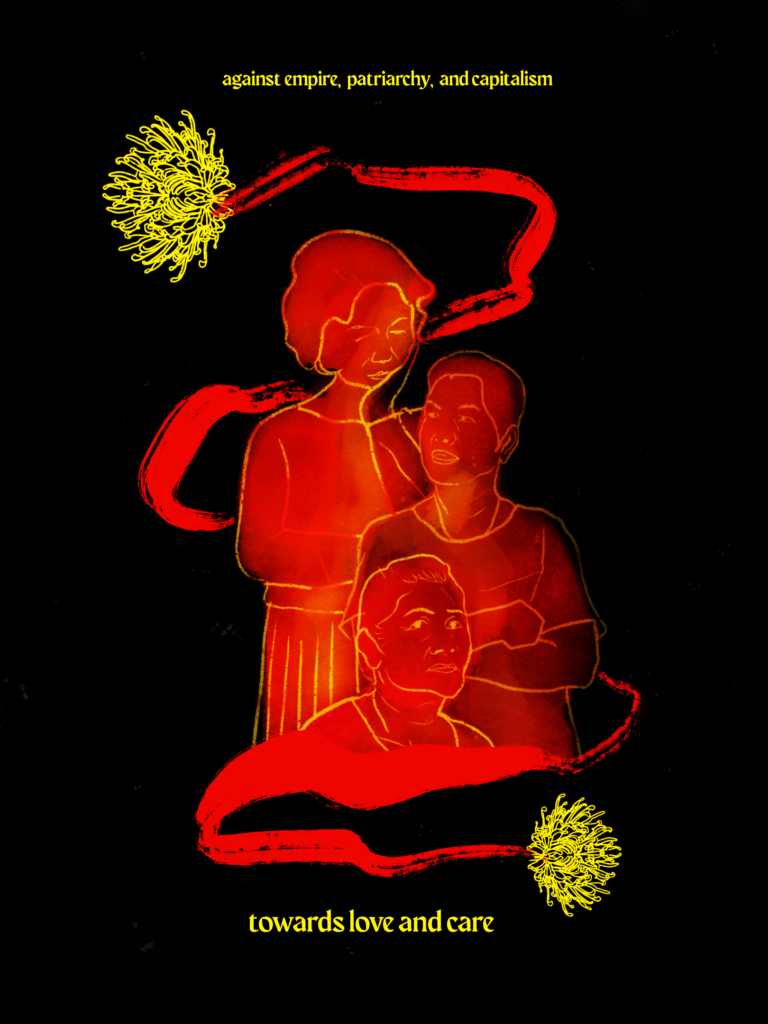
The recent violent attacks against Asian Americans, and specifically working class Asian American women, in Atlanta, the Bay Area and across the country, are horrific and racist. Solidaire Network declares our solidarity with Asian American and Pacific Islander communities and renews our commitment to funding movement building at the critical intersections of racial and gender justice.
Since the start of the COVID-19 pandemic, Stop AAPI Hate has recorded a 1900 percent increase in anti-Asian hate crimes in the United States including verbal harassment, physical assault, civil rights violations and online harassment. Women reported hate incidents 2.3 times more than men. These crimes are tied to growing anti-Asian rhetoric from the right that has cast China as America’s enemy and refers to the coronavirus as the “China virus” or “Wuhan virus,” and has contributed to the rise of white nationalist violence targeting AAPI communities. But we know that violence against Asians in this country is not new and is, in fact, rooted in the legacy of white supremacy, patriarchy, colonialism, and militarization.
Since people of Asian descent arrived in the United States, they have faced various levels of discrimination, exclusion and violence. In 1854, not long after Chinese immigrants began settling in California and western states during the Gold Rush, the Supreme Court ruled in People vs. Hall that people of Asian descent could not testify against a white person in court. The Page Act of 1875 restricted laborers from “China, Japan or any Oriental country” from entering the U.S., but in reality was about preventing Chinese women from coming, targeting them as prostitutes. The Chinese Exclusion Act in 1882 later banned all Chinese immigrants completely for 10 years. World War II drove greater anti-Asian sentiment, particularly against the Japanese and led to more discriminatory laws, incarceration and internment. Vietnamese immigrants were also attacked after the Vietnam War by the KKK and white extremists. These are just a few examples that illustrate the history of racism and otherization of Asians in this country. There are, unfortunately, so many more.
It’s critical that in our fight against anti-Asian violence, that we do not give space for anti-Blackness or increased presence of police and the carceral state. We are committed to multiracial coalition building and resourcing Asian-led and community-centered approaches to safety.
To effectively dismantle racism against AAPI communities, the entire spectrum of direct services to long-term movement infrastructure deserves long-term investment and solidarity. AAPI movement groups have traditionally been underfunded and overlooked by philanthropy, especially system changing work led by working-class women and femmes of AAPI descent. Currently, less than 1 percent of philanthropic dollars goes to funding AAPI causes, despite a powerful history of organizing and multiracial solidarity work. Asian Americans have joined forces with other communities of color in protesting the American colonization of the Philippines, the Vietnam War, advocating for civil rights led by revolutionary leaders like Yuri Kochiyama and Grace Lee Boggs, organizing against police brutality with the Black Lives Matter movement, and defending land and water protectors with Indigenous communities. In each day and in many ways, AAPI-led efforts make social justice more possible in the United States.
We believe in operating from a place of abundance and join AAPIP’s call for funders and donors to commit an increased amount of giving to these communities. Solidaire is mobilizing funds to our movement partners and networks that are addressing community safety and fighting anti-Asian racism and xenophobia. Here are some such organizations:
- AAPI Women Lead
AAPI Women Lead and the #ImReadyMovement aims to strengthen the progressive political and social platforms of Asian and Pacific Islander communities in the US through the leadership of self-identified AAPI women and girls. Their goal is to challenge and help end the intersections of violence against and within AAPI communities while working in solidarity with other communities of color. - Asians Americans Advancing Justice- Atlanta
Asian Americans Advancing Justice-Atlanta is the first and only nonprofit legal advocacy organization dedicated to protecting the civil rights of Asian Americans, Native Hawaiians, and Pacific Islanders (AANHPI) in Georgia and the Southeast. Their work is focused on policy advocacy, organizing & civic engagement, impact litigation, and legal services. - Asian Pacific Environmental Network (APEN)
The Asian Pacific Environmental Network focuses on Asian immigrant and refugee communities in Oakland and Richmond, California, bringing together a collective voice to develop an alternative agenda for environmental, social and economic justice. Working with multiple generations of Asian Americans in multiple dialects and languages, APEN plays a critical role in developing the leadership of AAPI communities. - CAAAV
CAAAV Organizing Asian Communities works to build grassroots community power across diverse poor and working class Asian immigrant and refugee communities in New York City. They were founded in 1986 by Asian working class women alarmed by the spike of hate violence on Asian communities and its root causes stemming from institutional racism in the United States. - Chinese Progressive Association
Since 1972, the Chinese Progressive Association has been educating, organizing and empowering the low income and working class immigrant Chinese community in San Francisco to build collective power with other oppressed communities to demand better living and working conditions and justice for all people. CPA engages in community education and organizing around health and environmental justice,workers’ rights, housing, immigrant rights, and other issues of concern to the organization’s members and constituents. - Community Coalition for Safety and Justice
Community Coalition for Safety and Justice is a coalition of Asian American community organizations in San Francisco that are addressing inter-ethnic violence, anti-Asian racism, and building the city’s capacity to create alternatives to safety and justice. - Equality Labs
Equality Labs is a South Asian technology organization dedicated to ending caste apartheid, gender-based violence, Islamophobia, white supremacy and religious intolerance. They build power through multiple strategies including community organizing, art, research, and digital security. - New Breath Foundation
New Breath Foundation is a philanthropic foundation that offers hope, healing, and new beginnings for Asian American & Pacific Islander new immigrants and refugees, people impacted by incarceration and deportation, and survivors of violence.
For additional resources and links to learn more about supporting AAPI communities, check out:
Supporting Power-Building and Long-Term Recovery in the South
SUPPORTING POWER-BUILDING AND LONG-TERM RECOVERY IN THE SOUTH
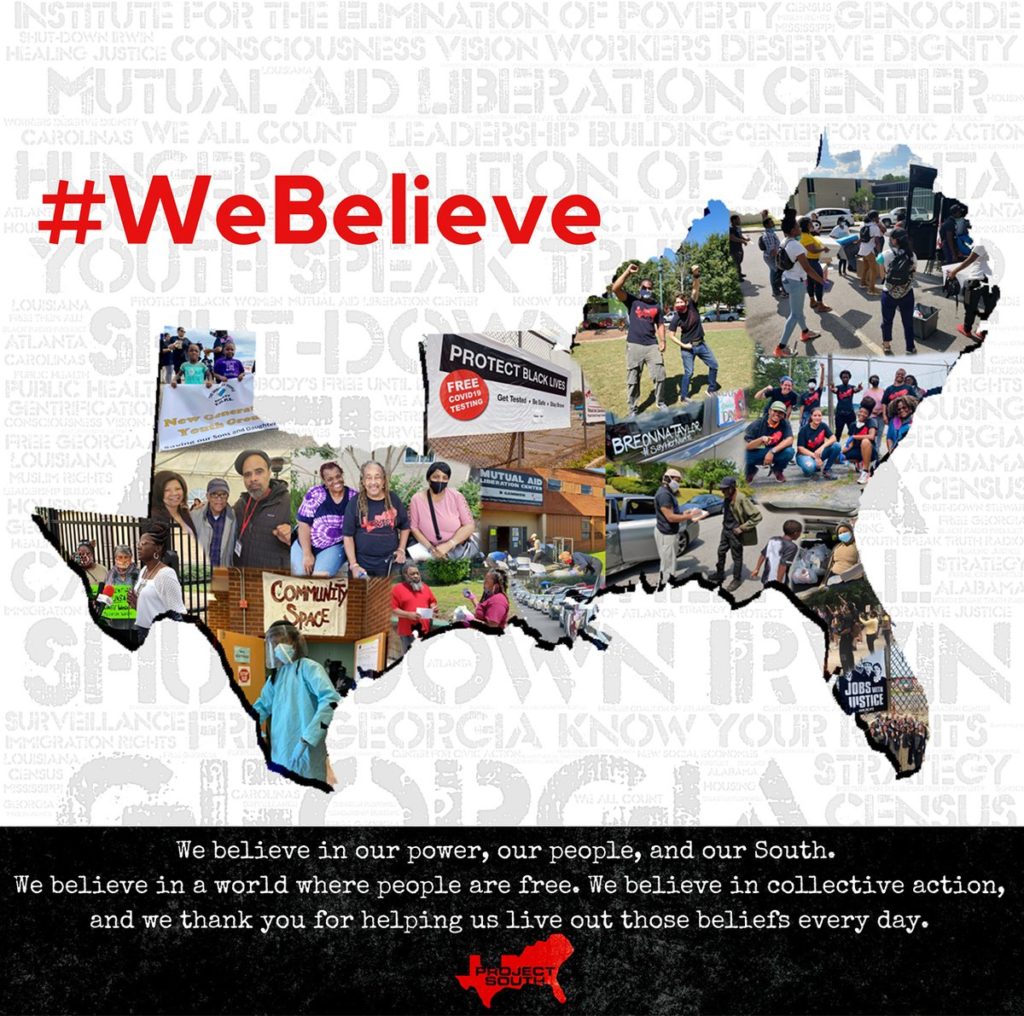
Last month, a winter storm catastrophe devastated communities across the South, stripping millions of people of basic utilities and material needs. Weeks after the winter storms, power outages and water shortages, several Southern states are still dealing with serious infrastructure issues, particularly Texas and Mississippi.
This crisis compounds multiple frontlines of corporate and state infrastructure failures with climate-driven extreme weather as well as the long-term disinvestment in communities of color. For those familiar with disaster response, there are multiple phases of disasters and disaster response. While attention may already be shifting away from immediate relief, communities in the South still need support to meet their basic needs and build long-term resilience.
Meeting Immediate Needs
Solidaire Network believes strongly in funding trusted mutual aid networks on the ground and movement-led infrastructure organizations. In the immediate aftermath of the storm, our members mobilized nearly $35,000 to more than 50 organizations and individuals across the South working on mitigating the immediate impacts of the storm. Organizations like BASTA delivered mutual aid efforts delivering water and food while also organizing tenants associations at properties where tenants have had prolonged water and power outages, fusing ongoing mutual aid with long-term power-building. Youth Rise Texas, a Solidaire grantee and movement partner, provided much-needed financial support and relief for its members and their families, including cash for portable water and weekly groceries. Youth Rise Texas understands that current and future ability to organize and build power across the state is not possible if members’ basic needs are not met. The People’s Advocacy Institute is another great organization that launched a rapid response fund to deliver water and help clean up in Jackson and impacted rural communities throughout Mississippi.
Resourcing Groups on the Ground for the Long-Term
Our community also has been supporting partners such as the Southern Power Fund organizing for short and long-term recovery across the region. The Southern Power Fund (SPF) was launched in 2020 to support frontline communities in the South in responding to this critical moment and resisting systemic oppression. The four anchor organizations of the Southern Power Fund include Southerners On New Ground, The Highlander Research and Education Center, Project South and Alternate Roots.
The Southern Power Fund is rooted in place, connected to hundreds of grassroots organizers and organizations that have worked together for decades throughout the South. Although SPF is a new effort, they are gaining more attention because of their powerful work that is led by those directly impacted by various socio-economic, cultural, and climate crises. The fund’s work is not funder-driven or housed in national organizations or intermediaries, but instead led by a steering committee, made up of Southern legacy organizations and long-term organizers who have decades of relationships and experience in the region. Solidaire is on the steering committee as a member of the philanthropic organizing team for the fund, and our members raised over $1 million as part of last year’s $10 million fundraising goal.
While groups and individuals on-the-ground in seven Southern states were scrambling to help their neighbors affected by the storm, the Southern Power Fund focused on resourcing smaller, Southern groups immediately. So far, the fund has organized and sent over $1 million to 48 people of color-led, grassroots groups in states dealing with crises. The funds moved from Southern Power Fund are general operating support to assist the groups with rapid response efforts that supply and connect families with material needs, but also support community organizing and political education. Because their 2020 fundraising ask of $10 million had been met, the Southern Power Fund anchor organizations were ready to activate quickly with cash on hand to support efforts on the ground.
How You Can Get Involved
Institutional funders interested in supporting the Southern Power Fund can contact Tamieka Mosley from Grantmakers for Southern Progress at [email protected] or Chantelle Fisher-Borne from Funders for LGBTQ Issues at [email protected].
Grantmakers for Southern Progress shares this advice for institutions on providing funds to groups responding on the ground to the current crisis. Here are two directives from Southern organizers:
1. If you have existing grantees in affected areas that are rooted in the communities hardest hit AND you are able to move funds to them in the next two weeks, send these organizations additional funds that are easy to access and with ultimate flexibility to move the funds in response to what conditions on the ground call for; and
2. If you are not able to move quickly or do not have existing grantees rooted in the hardest hit communities, move funds into the Southern Power Fund. Here’s a link to a one-pager that outlines what the Southern Power Fund has been able to do in response to the storm.
To receive a list of additional organizations that Solidaire members are supporting, please reach out to our Movement Partnerships & Grantmaking Practitioner Ada Smith: [email protected].
Lessons Learned from the Janisha R. Gabriel Movement Protection Fund
Lessons Learned from the Janisha R. Gabriel Movement Protection Fund
Solidaire launched the Janisha R. Gabriel Movement Protection Fund in September 2020 in direct response to our movement partners telling us about the urgent and immediate needs of movement leaders who were facing heightened risks, threats of violence and increased dangers due to the U.S. political climate in 2020.
We recognized that the movements in defense of Black lives were particular targets of increased state repression, vigilante violence and cyberattacks, and that trusted providers of security, legal and protection services should also be bolstered during this period.
Solidaire committed $1m to this fund as part of immediate needs from our Black Liberation Pooled Fund to ensure that the leaders and organizers associated with social movements fighting for collective liberation have the resources they need immediately for personal security and protection.
The criteria for the Movement Protection Fund were:
• Furtherance of Solidaire’s charitable purposes of serving and protecting social movements and their leaders.
• Funds to be utilized within the next 1-3 months towards the infrastructure and security support needs of movement organizations and their leaders.
• Funds to be utilized especially by movement leaders and organizations within the movement ecosystem targeted by threats and acts of violence and intimidation.
A committee of both staff and Solidaire members reviewed each application. Due diligence was conducted by Solidaire and, on average, decisions were made within 48 hours. Resources then moved within 7.5 days from initial submission to payments posting.
As of the closing of the fund, over $2.2M in urgent protection funding was moved to 44 organizations, collectives and individuals working in movements for liberation. The average grant size was approximately $53,000 with grants ranging from $2,000 – $150,000.
Top Areas Funded:
• Digital security
• Physical security
• Legal support
Support in the above-named areas went toward both supporting individuals, organizations and collectives in need of these security measures as well as funding the capacity builders and organizations that provide these services.
Top Organizing Issues Funded:
• Uprising for racial justice
• Voter suppression and get out the vote campaigns
Of the 44 grants moved, 19 are new partnerships with Solidaire Network, defined based on applicants self-reporting whether they had any relationship with staff, board members, movement partners or donor members of Solidaire.
Initial Learnings:
• The scale and need for movement safety and security is immense, way beyond Solidaire’s capacity to meet alone.
• Movements are in need of stronger, values-aligned safety and security infrastructures in order to do their work and keep themselves safe from threats and acts of violence from the state, non-state actors and from white supremacists.
• We must embody trust-based philanthropic practices in order to keep our people safe and to win. Doing so is what enabled Solidaire to move these resources to the ground quickly.
• Digital and physical security are critical to movements. Investing in long-term movement infrastructure builds a stronger and more nimble ecosystem ready to respond and able to be in a proactive stance.
• Movements have the vision for and models needed to build a vibrant and abundant ecosystem–what they are lacking is the resources to put their plans in place.
• Requests that did not meet the fund’s criteria amplified the ways in which racialized capitalism deepens social inequities. Applications to support mutual aid efforts, housing, food and educational needs of Black, Indigenous and people of color (BIPOC) communities brought to focus the failure of government and public infrastructure in ensuring that fundamental human rights are met for our people.
Next Steps:
• Check-ins with movement partners from this fund to begin in January 2021
• Solidaire staff will engage in sensemaking and take the learnings from the Movement Protection Fund to:
– Inform upcoming Solidaire pooled grantmaking vehicles
– Mobilize philanthropy to fund movement infrastructure and capacity building needs
Solidaire Network Announces $1 Million for Movement Protection As Part of the Black Liberation Pooled Fund
Solidaire Network Announces $1 Million for Movement Protection As Part of the Black Liberation Pooled Fund
FOR IMMEDIATE RELEASE
Media Contact:
Bilen Mesfin Packwood, [email protected]
Solidaire Network Announces $1 Million for Movement Protection In Honor of Janisha R. Gabriel As Part of the Black Liberation Pooled Fund
OAKLAND, CA – Solidaire Network announced today $1 million for movement protection as part of the Black Liberation Pooled Fund to honor Janisha R. Gabriel, Solidaire’s former communications lead who passed away on September 6, 2020 after fighting cancer. This will be the first round of grants since Solidaire launched the Black Liberation Pooled in June 2020.
“Janisha lived a life of love and transformation, changing the world every day with her grace and profound compassion,” said Rajasvini Bhansali, executive director of Solidaire Network. “She was a life-long activist and organizer, bringing with her a deep movement ethos and creative fire to Solidaire. With these grants through the Black Liberation Pooled Fund, we hope to honor her legacy and devotion to movement-building and Black liberation.”
Solidaire aims to allocate $1 million from the Black Liberation Pooled Fund prior to December 2020 toward urgent and immediate needs of movement leaders facing heightened risks, targeted by threats of violence and confronting increased dangers due to the current political climate in the United States.
Through the Black Liberation Pooled Fund, Solidaire is moving money to the powerful ecosystem of Black-led social change organizations around the country, and will make multi-year grant commitments, with the first $10 million moving within 2020-2021. The Black Liberation Pooled Fund was launched in June 2020 as a critical opportunity for donors and foundations to step up in defense of Black lives. In August, the David and Lucile Packard Foundation pledged $20 million over the next five years to the fund as part of its commitment to improve grantmaking to support justice and equity.
“Movements in defense of Black lives are targets of increased state repression and vigilante violence and cyberattacks,” said Jason Franklin, Solidaire Network’s Board Co-Chair. “We are committed to ensuring that social movement leaders and organizers have the resources they need immediately for their security and protection.”
Janisha Gabriel joined Solidaire Network in 2018 as a communications consultant, later becoming Solidaire’s communications manager and digital organizer. She redefined Solidaire’s visual identity, digital presence and storytelling approach and used her creative talent to build the first website and logo for New York’s Black Lives Matter chapter. Janisha was also a fierce advocate for LGBTQIA+ rights, social justice, and Black history, culture and art.
Prospective grantees can apply through this secure link.
About the Solidaire Network: Since 2011, inspired by the progression of movement moments from anti-austerity, to the Arab Spring and Occupy, Solidaire Network has worked to create a more radical model and vision for giving. As a community of donor organizers, the network supports social movements and grassroots efforts led by Black, Indigenous, immigrant, and other marginalized communities. Through its donor organizing and grantmaking, Solidaire Network aims to build a fair and just society and a healthy, thriving planet where all people flourish and have the power to shape the decisions that affect their lives. Learn more at https://solidairenetwork.org/.
Solidaire Mourns Janisha R. Gabriel, Our Movement Warrior
Liberating Wealth in Defense of Black Lives
Liberating Wealth in Defense of Black Lives
By Rajasvini Bhansali, Executive Director
Born out of a need to fight against corporate greed, economic inequality, and gender and racial injustice, Solidaire Network is a community of donor organizers who move quickly to get critical resources to the frontlines of social justice movements.
This community has been mobilized more than ever by the bold leadership and efforts of social movements around the country. As the fight against anti-Blackness and for Black liberation grows across the globe, we have intensified our efforts to ensure that movements have what they need to win now and for the long-haul.
Since our inception, the Solidaire Network has been committed to supporting Black liberation work by cultivating authentic, just and right relationships with Black-led organizations and community leaders. Our charge is to invest in movements so they can do the transformative work that benefits us all. Through the network, Solidaire members have moved nearly $8 million since 2013 in response to the call to philanthropy from the Movement for Black Lives to fund the movement, with trust in the wisdom and leadership of grassroots organizers.
Since June—and the start of this summer of uprising—Solidaire members have committed more than $10 million to the Black-led organizing ecosystem, including powerful efforts like Movement for Black Lives, the Southern Power Fund and Reparations Summer.
I am also thrilled to share that this week, the David and Lucile Packard Foundation has committed $20 million to Solidaire Network’s Black Liberation Pooled Fund over the next five years. The contribution is part of the Packard Foundation’s new $100 million commitment over the next five years to improve its grantmaking to support justice and equity.
Through the Black Liberation Pooled Fund, Solidaire is pooling resources to support the powerful ecosystem of Black-led social change organizations around the country including groups that are strengthening multiracial alliances; innovating grassroots climate justice solutions; working on decarceration and decriminalization of Black bodies; building regenerative economic models and community wealth strategies for shared prosperity; nurturing the leadership and capacity needs of movement organizations; imagining and creating our democratic, pluralistic, feminist futures and so much more. We are refining our grantmaking strategy to remain grounded in the immediate and long-term infrastructure building needs of the movement.
At the same time, we are evaluating the first five years of Solidaire’s Aligned Giving Strategy. Designed and driven by movement leaders, this strategy aims to provide long-term organizational support to Black-led movement building organizations, build capacity for shared movement infrastructure, and bolster economic independence and political power. Lessons learned from directing our members’ giving to these strategic interventions are now shaping our grantmaking through the Black Liberation Pooled Fund.
We know that much more remains to be done and, seven years in, our work is only just beginning. Across the country, movement leaders continue to organize for racial, economic and social justice in the face of an unprecedented pandemic, the global rise of white supremacy and authoritarianism, and the continued and destructive impact of systemic racism. These courageous leaders are not stopping anytime soon – and neither are we. Solidaire’s theory of liberation—our guiding strategy for the next decade—calls on us to serve as a critical resource mobilization arm for movements with the goal of moving $1 billion over the next 10 years so grassroots organizers have more of the resources they need to win.
At Solidaire, we believe people with wealth must act as “donor organizers” to dismantle unjust economic, political and cultural systems by directing significant resources toward movements for social and racial justice. We know our dreams and our shared fate are bound up with those most directly impacted by injustice. Solidaire members don’t give out of charity or paternalism. The only people we wish to “save” are ourselves by doing our part to make amends for the generations of oppression and theft upon which the current economic system has been built.
Supporting Black- and Indigenous-led social change advances racial and social justice for all people. The Black freedom struggle resulted in advancements for women, people with disabilities, LGBTQIA+ folks, immigrants and workers of all colors. Today, the work of visionary Black organizers and advocates has made broad systemic change—from defunding the police to police-free schools to reparations and reinvestment in community well-being—not only possible but also imminent.
Doing more in this moment requires that we not hoard wealth, but instead respond with care and abundance to the needs and demands of the movements that are working to dismantle systemic racism and create conditions for all of us to thrive.
In this moment and beyond, we remain committed to doing all we can to liberate wealth in defense of Black lives—now and for a generation.

